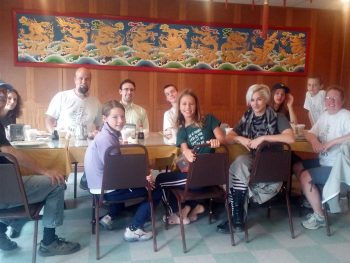Get out there and speak! (Part 1) Posted by Tomaso on Jul 24, 2017 in Esperanto Language
Speaking is learning
The Esperanto word for tongue is lango. The overlap of the first four letters (lang) with the word language is not a coincidence. Language is first and foremost a spoken phenomenon. Human beings have been using their tongues to speak for at least tens of thousands of years, while written language arose only a few thousand years ago. Writing is in our head, but speaking is in our bones. To really learn a language, you’ve got to speak it.
Esperanto is different from many other languages in that it was invented and published first in written form. Many Esperanto speakers learn first on their own using a book or other written materials. Even in this modern world of YouTube videos and video conferencing, it’s not uncommon to meet people who say “Mi parolas Esperanton por la unua fojo nun” (I’m speaking Esperanto for the first time now.) Nevertheless, our brains process language best when it’s spoken, so get out there and speak.
Online learning is great but…
A study by the U.S. Department of Education has proven that the combination of computer-based learning programs and live, human instruction is far superior to either method of learning independently. This is what I read in some material from Transparent Language (who hosts this blog), but it fits with my experience, and the experience of other Esperanto teachers that I’ve discussed this with. You don’t need a teacher to spoon-feed you vocabulary or simple grammatical information, but a human teacher can help you over hurdles in a way that is specific to you.
As a side note, Transparent Language offers an online course and Virtual Coaching for several languages, which may be of interest to some readers. They also have a course in Esperanto, but that doesn’t include the virtual coaching. If you’d like to learn Esperanto through this combination of online learning and live instruction please contact me directly for the teaching portion.
Pay for knowledge, not gas
Hiring an experienced on-line teacher is a great value when compared to the cost of traveling to another city, state, or country – or even to driving across town and buying a specialty coffee, but speaking Esperanto can be done on even the tightest budget. If you have already completed a basic course in Esperanto online (or in person) you should look into the Ekparolu Project where you can be paired up for free with an experienced speaker for conversation practice via video conference. I have met the administrator of that program and she presented the program in detail.
Free doesn’t have to mean you’re all alone
Not too infrequently I will see announcements from beginners who are looking for other beginners to video chat with. Perhaps they think speaking to another beginner will be less intimidating. Maybe, even after deciding to learn Esperanto, it still hasn’t sunk in that there really are experienced speakers out there to talk with. This sort of thing may be fun, but it can turn into pooled ignorance and awkward silences where neither party knows what to say or how to say it.
With the Ekparolu program (and by the way, did I mention yet that it’s free if you’ve finished a basic course?), the geonkloj (mentors, literally “aunts and uncles”) are experienced speakers from several different countries, all of whom have been through training on how to keep a conversation flowing and gently encourage new learners to speak.
It’s normal to feel nervous at first when speaking, but everybody has been in that position and everybody who has been through the program says that speaking live with another person has helped them develop fluency and confidence.
Stay Tuned
There are so many ways to get out and speak Esperanto – and doing so is so important – that we’re going to continue this topic next month. Points covered will include
- How to find people near you to talk to.
- How to find events worth going to.
- How to get the most language-learning bang for your travel buck when you go to an Esperanto event.
Speaking of Esperanto events, due to my work teaching at NASK (Nord-Amerika Somera Kursaro) in Raleigh this month, this blog post was delayed slightly, but in August we’ll be back to our regular schedule – the second Monday of each month (in this case, August 14) where we will continue with the above points.
Ĝis tiam, bonan paroladon!

Build vocabulary, practice pronunciation, and more with Transparent Language Online. Available anytime, anywhere, on any device.




